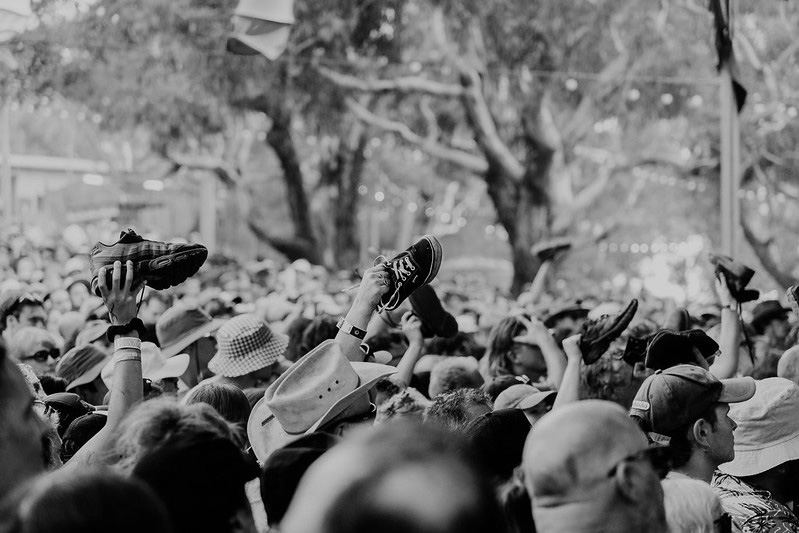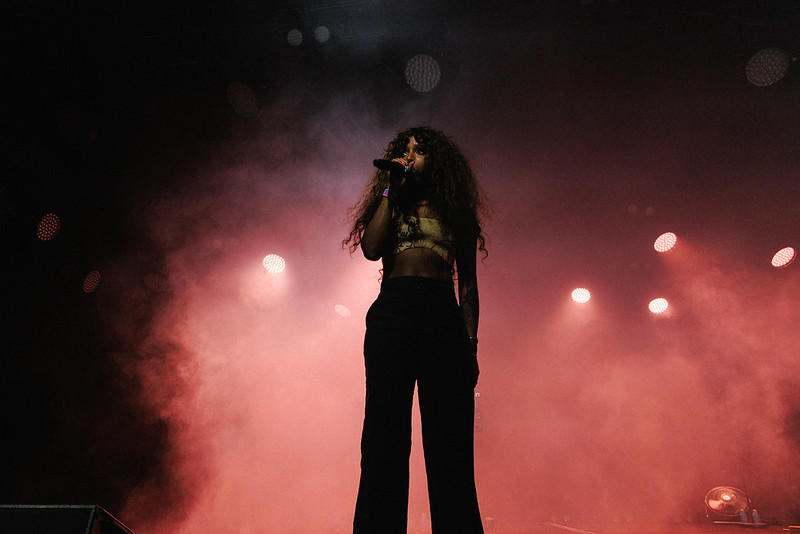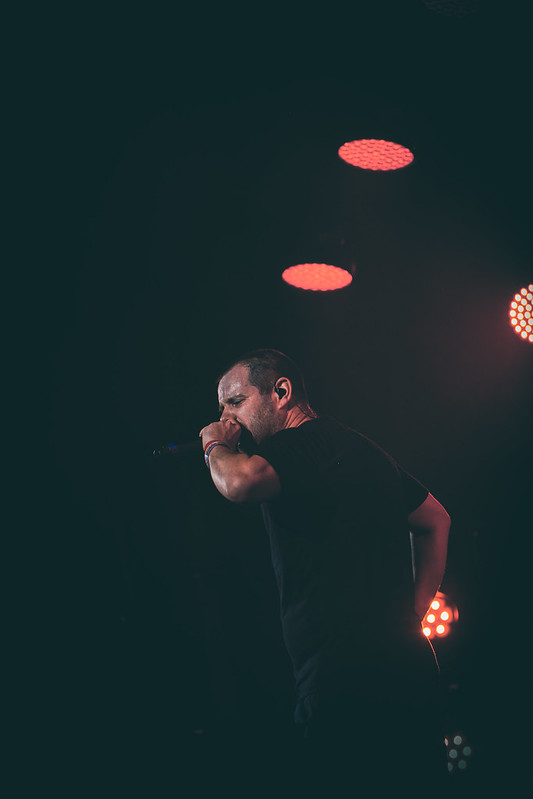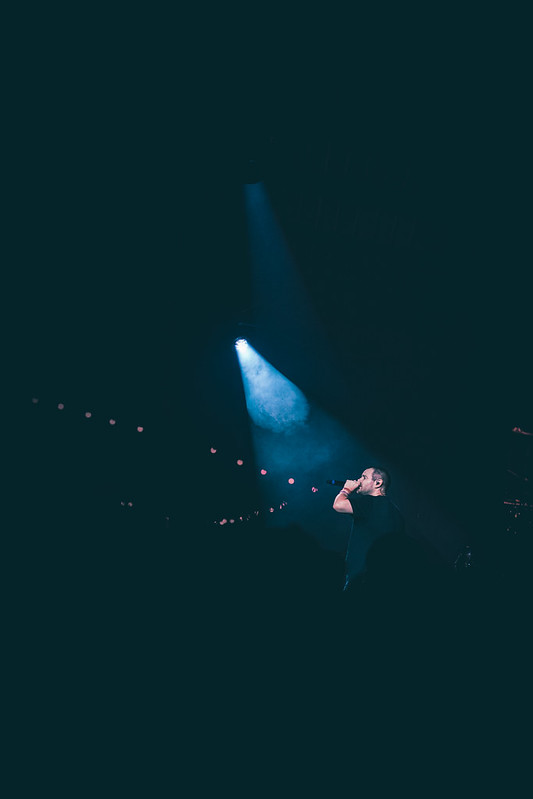To Boot or Not to Boot: In Defence of Mike Skinner’s Antics at Golden Plains

Just three months after a rain-heavy Meredith, Golden Plains Sixteenth Edition played host to an oppressive heat wave. Swapping raincoats and gumboots for sunscreen and broad brims, the weekend was centred around survival. During the day, we only went to watch an artist if we were willing to get sunburnt for them, or were open to sitting down and watching under the ‘Sup’s eucalypts. If not on the dance floor, we stayed at our campsite, chatting to the people who drove two hours with us, had sat in the hour-long festival entry queue with us, and would now endure a large portion of the festival in camp chairs under a gazebo.
Fortunately, there was lots to talk about, especially how various performers interacted with the festival’s boot-lifting tradition, which sees festival-goers championing acts by holding their shoe in the air.
Midway through Charlotte Adigéry’s transcendent set alongside her double-act partner Bolis Pupil, she paused to ask an audience member the meaning behind their lifted boot. The audience member quickly told her that they lift their boots for their favourite acts. Adigéry’s incredulous reaction was moving to watch. She wasn’t the only one with a tear in her eye.

MJ Lenderman broke the prevailing interstitial silence of his own set to apologise to anyone who had attended his Melbourne show days earlier. Having caught early wind of our Boot-lifting practices—but not quite mastered the fundamentals—Lenderman had confidently called a boot held aloft a “Shoey”. His apology was graciously accepted by the Golden Plains audience, struck as we were by the realisation that we are a culture beset with an unusual number of boot-based traditions.
Most controversially, The Streets’s Mike Skinner made The Boot the cornerstone of his set. From the moment the staccato strings of his opener ‘Turn the page’ began, he was on a mission to have every boot in the ‘Sup lifted. Performing barefoot—leaving his shoes besides a bottle of champagne on a small pedestal next to him—Skinner unveiled his broader plan between songs: “I’m gonna walk all the way up the centre of the crowd, I’m gonna meet the Smiley Face, I’m gonna get up on someone’s shoulders, and I’m gonna raise my shoe in the air. And if you would like to be famous, or you would just like to celebrate this festival with me, I would like you to raise your shoe with me.”
So ludicrous was the suggestion that its meaning was difficult to comprehend. Of all the sets that weekend, this one attracted the highest proportion of the festival’s attendees. Skinner’s words proved to be accurate. When his set wound to a close an hour later, he parted the crowd like the Red Sea, walked to the smiley-faced doof stick, began crowd surfing, and then lifted his boot in unison with the 12,500-odd people in the amphitheatre.
While no one could dispute the impressive logistical feat, some people felt that Skinner had "hijacked" The Boot. Their criticism centred on a conceptualisation of the Boot as a pure and un-galvanised manifestation of audience joy, a force that shouldn’t be manipulated by performers in order to make their sets appear more loved than they were. To them, the request for a lifted Boot was as uncomfortable as the request for a 5-star rating by an Uber driver. Whether you enjoyed the experience or not, the pressure to praise it casts a pall over the whole thing. Some saw the whole thing as arrogant.
It was easy to draw comparisons between Mike Skinner and Liam Gallagher, who performed at Meredith in 2019. Cool Britannia—a movement that treasured showmanship, excused hedonism, and cared little about sexism—spawned them both. Nowadays, Skinner and Gallagher headline festivals around the world, and nostalgic fans are excited to see them until they show up and deliver “toxically masculine” performances. Nothing has changed: they perform with the same swagger; only now audiences have the language to verbalise their icky feelings when witnessing their laddish displays.
Still, there is a crucial difference between Skinner and Gallagher’s approaches to their respective shows at the Meredith Supernatural Amphitheatre. While Gallagher’s was replete with the egotistical epithets we have come to expect from the stereotypical turn-of-the-century front man, Skinner chose to redirect the crowd’s admiration away from himself and towards the festival. Self-congratulatory though it may have been, Skinner was committed to the idea that “we all say, ‘Thank you, Golden Plains',” whereas Gallagher was determined to continue flogging the ‘best fookin’ band in the world’ horse.
Neither Skinner nor Gallagher would survive their contemporary performances if they completely rebuffed the showmanship of their golden days. But at least Skinner does his best to bring well-deserving people into the scope of praise. His decision to sign off at the end of the set by saying, “Thank you, Golden Plains. I’ve been Jeff Mills. Good night,” revealed an authentic humility in sharing the festival’s headline with one of his personal idols.
Critiques of Mike Skinner's boot-lifting antics don't take into account the possibility that Golden Plains genuinely humbled him. Mike Skinner didn’t hijack the best song award; he coordinated an ambitious expression of gratitude from us to our favourite festival. Best of all, he helped us use the festival’s own code to do it.
Arlo Parks' Frankenstein Approach to Music Making
By Rob Feher
Arooj Aftab Moves From Delicate to Daring
By Jonah Orbach
Collective escapism
By Hugh Barton
Unveiling the Neoverse
By Hugh Barton
Leon Vynehall on Holding On and Moving Forward
By Rob Feher
Meredith Music Festival's Wet and Wild Thirty-First Edition
By To Be Team

